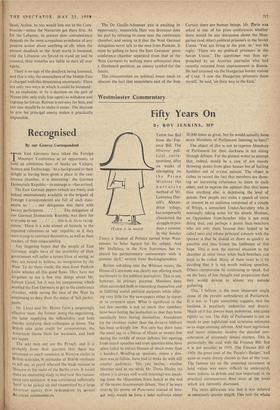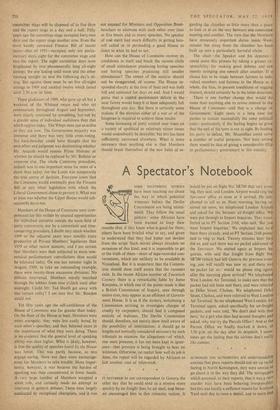Westminster Commentary
Fifty Years On
By ROY JENKINS, MP
Before subsiding into the Whitsun recess, the House of Commons was clearly not offering much. excitement to the political journalists. This is not, however, its primary purpose. Members have often succeeded both in interesting themselves and in fulfilling useful political purposes while offer- ing very little for the newspapers either to report or to comment upon. What is significant in the last few months is not so much that members have been boring the journalists as that they have manifestly been boring themselves. Attendance (in the chamber rather than the division lobbies) has been strikingly low. Not only has there been the usual sag to a House of fifteen or twenty-five during the middle of major debates, but opening front-bench speeches and even question time have often failed to attract House's of much more than a hundred. Winding-up speakers, unless a divi- sion was to follow, have had to Make do with still smaller audiences. `Do you realise,' another Member said to me while Mr. Denis Healey (to whom it is always well worth listening) was speak- ing from the Opposition front bench at the end of the recent disarmament debate, 'that if he were making his points on Panorama instead of here, not only would he have a total audience about
50,000 times as great, but he would actually have more Members of Parliament listening to him?'
The object of- this is not to reprove Members of Parliament for their slackness in not sitting through debates. For the present writer to attempt that, indeed, would be a case of not merely throwing stones from glass houses but of hurling boulders out of crystal palaces. The object is rather to record the fact that members are show- ing an increasing reluctance to listen to each other, and to express the opinion that this; more than anything else, is depressing the level of debate. Few people can make a speech of verve or interest to an audience composed of a couple of Whips, a somnolent Under-Secretary who is nominally taking notes for his absent Minister, an Opposition front-bencher who is not even doing that, and perhaps a dozen, back-benchers who are only there because they hoped to he called next and whose principal concern with the speaker is that he shciuld sit down as quickly as possible and thus hasten the fulfilment of this hope. This is now the normal situation in the chamber at most times when back-benchers can hope to he called. Many of them react to it by deciding that it is not worth making speechei. Others compromise by continuing to speak, but on the basis of less thought and preparation than they would devote to almost any outside gathering.
This, I believe, is the most important single cause of the present somnolence, of Parliament. It is not, as Taper sometimes suggests, that the business is peculiarly pedestrian and dreary. Much of it has always been pedestrian, and quite rightly so, too. The duty of Parliament is just as much to pass legislation and scrutinise estimates as to stage amusing debates. And most legislation and many estimates, involve the detailed con- sideration of extremely dreary matters. This is particularly the case with the Finance Bill. But it is not peculiar to 1959. The Finance Bill of 1909, the great year of the 'People's Budget,' had quite as many dreary clauses as that of this year The famous tax on the unearned increment in land values was more difficult to understand, more tedious to debate and less important in its practical consequences than most of the taxes which are currently discussed.
The main difference was that it was debated at immensely greater length. This year the whole committee stage will be disposed of in five days and the report stage in a day and a half. Fifty years ago the committee stage occupied forty-two days and the report stage another nine. Even the most keenly contested Finance Bill of recent years—that of 1951—occupied only ten parlia- mentary days, eight for the committee stage and two for report. The eight committee days were lengthened by two phenomenally long all-night sittings, the one lasting until noon and the other running straight on into the following day's sit- ting. But against these must be set five all-night sittings in 1909 and another twelve which lasted until 2.30 a.m. or later.
These gladiators of 1909, who gave up all but a weekend of the Whitsun recess and who sat continuously throughout August and September, were clearly sustained by something, but not by a greater sense of individual usefulness than that which applies today. The Whips were just as active as they are now. The Government majority was immense and there was very little cross-voting. No back-hencher could have thought that his own effort and judgment was determining whether Mr. Asquith would remain Prime Minister or whether he should be replaced by Mr. Balfour or someone else. The whole Commons procedure, indeed, was in one important sense far more of a sham than today, for the Lords was temporarily the true centre of decision. Everyone knew that the Commons would eventually pass the Finance Bill or any other legislation with which the Liberal Government chose to present it. What was at issue was whether the Upper House would sub- sequently do so too.
Members of the House of Commons were com- pensated for this neither by unusual opportunities for individual initiative outside the main field of party controversy nor by a convenient and time- conserving procedure. I doubt very much whether 1909 or the adjacent years were notably more productive of Private Members' legislation than 1959 or other recent sessions; and I am certain that Members were then subjected to more non- sensical parliamentary convolutions than would bey tolerated today. On one hot summer night in August, 1909, to take an outstanding example, there were twenty-three successive divisions. No debates intervened. Members merely marched through the lobbies from nine o'clock until after midnight. Could Mr. Ted Heath get away with this torture today? I am sure that Mr. Bowden could not.
Yet fifty years ago the self-confidence of the House of Commons was far greater than today. On the floor of the House at least, Members were more energetic; they were less easily bored by each other's speeches; and they believed more in the importance of what they were doing. There is no evidence that the general level of speaking ability was then higher. What is likely, however, is that the quality of speeches heard by the House was better. This was partly because, as was argued earlief, there was then more encourage- ment for Members to take trouble. More impor- tantly, however, it was because the burden of speaking was then concentrated in fewer hands. A• very large number of Members accepted a silent role, and certainly made no attempt to intervene in general debates. These were largely conducted by recognised champions, and it was not unusual for Ministers and Opposition front- benchers to alternate with each other over four or five hours and as many speeches. No speaker of real merit had much difficulty in getting him- self called or in persuading a good House to listen to what he had to say.
How can the House of Commons recover its confidence in itself and break the vicious circle of small attendances producing boring speeches and boring speeches producing still smaller attendances? The extent of the malaise should not be exaggerated, of course. The House re- sponded sharply at the time of Suez and was both full and animated for days on end. And I would guess that a capital punishment debate in the near future would keep it at least adequately full throughout one day. But there is certainly some malaise if the stimulus either of a war or of the hangman is required to achieve these results.
Some loosening of party control over votes on a variety of apolitical or relatively minor issues would undoubtedly be desirable; but this has been sufficiently canvassed elsewhere. What is more necessary than anything else is that Members should break themselves of the new habit of re- garding the chamber as little more than a place to look in at on the way between one committee meeting and another. The view that the Members have immensely important duties inside West- minster but away from the chamber has been built up into a particularly harmful cliche.
The chair—the Speaker and his deputies— could assist this process by taking a greater re- sponsibility for making good debates and not merely stringing one speech after another. If a choice has to be made between fairness to indi- vidual members and fairness to the House as a whole, the bias, in present conditions of sagging interest, should certainly be in the latter direction.
There is one further change that would do more than anything else to revive interest in the House of Commons—and that is a change of Government. Eight years is a long time for parties to sustain successfully the same political roles—particularly if the feeling begins to grow that the end of the'term is not in sight. By leading his party to defeat, Mr. Macmillan could serve a number of useful purposes. Not least among them would be that of giving a considerable fillip to parliamentary government in this country.







































 Previous page
Previous page